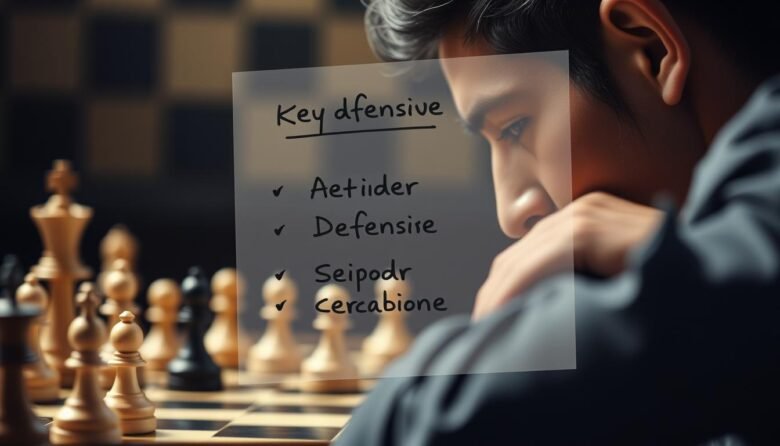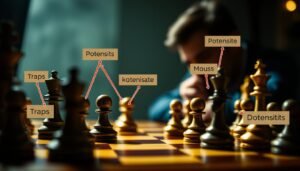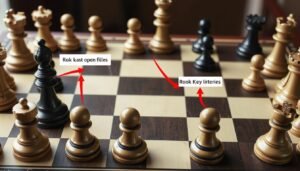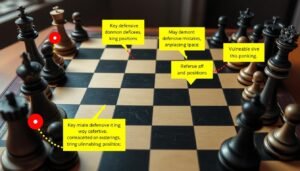In chess, the psychology of defense is key to winning. Players must stay calm when the game is intense. This helps them create strong defensive plans.
Understanding your mind is crucial in chess defense. It can greatly improve your performance when defending. We will look at how to stay calm and focused during these moments.
Understanding Chess Defense Psychology
Chess defense psychology is key to a player’s game approach. It’s vital to grasp the chess defense dynamics for better performance. Players need to master chess defense techniques to safeguard their positions and counter opponents’ threats.
Defining Chess Defense
Chess defense is about protecting your pieces and setting up defenses against your opponent’s moves. Good chess strategies mix offense and defense. But, a strong defense is crucial. Players must anticipate threats and act quickly to change the game’s direction.
The Importance of Mindset
A strong mindset is essential for chess success. A defensive mindset helps players stay calm and think clearly under pressure. Being mentally ready for surprises can greatly improve performance in tough moments.
Characteristics of a Defensive Player
Defensive players have certain traits that help them on the board. These include:
- Patience: Waiting for the perfect moment to counterattack is key.
- Analytical Thinking: Seeing through different positions and moves gives a strategic advantage.
- Adaptability: Changing strategies based on the opponent’s style makes a player more resilient.
Common Psychological Challenges in Defense
Players face many psychological hurdles when playing defensively in chess. Knowing these challenges helps us stay focused and effective under pressure.
Fear of Losing
The fear of losing can really affect a player’s mindset. This fear might cause hesitation and make it hard to make good moves. The first step to beat this fear is to acknowledge it. Building confidence and a positive self-image can help a lot.
Overthinking Moves
Overthinking often comes from the fear of making mistakes. Players might spend too much time thinking about each move. This can slow down the game and make it hard to make decisions.
By balancing thinking with instinct, we can avoid overthinking. This makes the game smoother and more enjoyable.
Managing Anxiety
Anxiety can mess with a player’s focus and performance. Using self-talk and relaxation techniques can help keep focus. A good strategy for managing anxiety helps players stay calm in tough situations.
Techniques for Building Mental Resilience
Building mental resilience in chess is key for players wanting to improve their defense. Using psychological training can greatly boost focus and performance under pressure. There are many ways to strengthen your mental game.
Visualization Strategies
Visualization helps players practice defensive moves in their mind. By imagining success in tough spots, they feel more ready for real games. This builds confidence against tough opponents.
Mindfulness Practices
Mindfulness boosts concentration and awareness in games. Activities like meditation keep players focused, reducing distractions. This focus helps players stay calm under stress, improving their mental game.
Breathing Exercises
Breathing exercises are simple but effective for stress relief. They help players calm down and think clearly. A steady mind is crucial for making good decisions in intense games.
The Role of Experience in Defensive Play
Experience greatly shapes a player’s defensive chess strategies. By looking at past games, players can improve their skills. They learn to adapt their strategies based on what worked before.
Learning from Past Games
Looking back at past games helps players see their strengths and weaknesses. They can figure out what strategies were successful and what needs work. This helps them develop better defensive techniques for future games.
Adapting to Opponent Styles
It’s important to know and adjust to different opponent styles for a strong defense. Players learn to spot patterns and tendencies in their opponents. This helps them counter moves more effectively, using their experience to outsmart their opponents.
The Value of Practice
Practicing regularly is key to improving defensive skills. By playing different chess positions, players can try out various defensive techniques. This practice sharpens their tactics and helps them understand how to respond in different situations.
Emotions and Their Impact on Defensive Strategy
In chess, emotions play a big role in how we make decisions and defend. Knowing what triggers emotions is key to being emotionally smart in chess. Players often feel strong emotions during key moments, which can mess up their thinking or lead to quick, bad choices. Spotting these triggers helps players control their feelings and stay focused.
Recognizing Emotional Triggers
It’s important to know what makes you feel upset during a game. Common things that might upset you include:
- Critical moves from the opponent
- Feeling overwhelmed by the game complexity
- Past performances influencing current emotions
By knowing what triggers your emotions, you can find ways to deal with them better. This can help you play better overall.
Using Emotions Positively
Emotions aren’t always bad; they can also motivate us. Using positive emotions can help you stay focused and make better decisions. For example, feeling excited or determined can fuel a strong defense strategy. This can lead to more thoughtful and effective moves during the game.
Emotional Regulation Techniques
It’s crucial to have ways to manage your emotions for better defensive play. Some good strategies include:
- Changing negative thoughts into positive ones
- Using deep breathing to stay calm
- Practicing mindfulness to keep your focus
Using these methods can help you keep your emotions in check. This can make your chess play more strategic and less impulsive.
The Influence of Pressure on Decision Making
Pressure in chess changes how well a player makes decisions. The level of pressure can make players react differently. This is especially true in big tournaments.
Types of Pressure Situations
Players face many types of pressure, including:
- Time limits that cut down on thinking time for each move.
- Opponents who try to intimidate them.
- High expectations from fans or coaches that add stress.
- Stakes that can change their career, like in major tournaments.
Effects of Time Constraints
Time limits greatly affect decision making under pressure. Quick decisions can lead to mistakes. This can change the game’s direction.
Studies show that players often rely on instinct when time is short. This increases the risk of errors.
Handling High-Stakes Matches
High-stakes matches are tough for players. It’s key to stay focused to make good decisions. Mental training and practice can help players stay calm.
The Connection Between Psychological Preparedness and Performance
Psychological preparedness is key in chess to improve performance. Good pre-game strategies can greatly affect a player’s mindset. A strong mental base helps players focus and make better decisions during the game.
Importance of Pre-Game Routines
Having consistent pre-game routines is essential for mental readiness. These routines can include activities to help players focus and build confidence. Some effective routines might include:
- Analyzing past performances for insights.
- Practicing visualization techniques to foresee potential scenarios.
- Engaging in physical warm-ups to boost energy levels.
Setting Realistic Expectations
Setting realistic expectations is crucial for a balanced mindset. Players should know their strengths and weaknesses, and their opponents’. This knowledge helps players play without too much pressure, creating a positive game atmosphere.
Developing a Defensive Game Plan
Creating a solid defensive game plan is key for chess players wanting to improve. It involves several important elements for success in chess defense.
Analyzing Past Performances
Looking at past games can give great insights. By studying past games, players can see what worked and what didn’t. This helps them make better plans for future games.
It lets them find mistakes and successful moves. These can be crucial for improving their defensive strategies.
Identifying Strengths and Weaknesses
Every player has their own strengths and weaknesses. Knowing these helps tailor a defensive plan that fits their style. For example, some players are great at holding a strong defensive position.
Others might be better at launching counterattacks. Understanding these differences helps create a more effective game plan.
Crafting Flexible Strategies
Chess is a game that changes quickly, so being flexible is important. Creating strategies that can be adjusted during the game is essential. This means being able to switch from defense to offense based on the opponent’s moves.
This flexibility keeps players ready to adapt to the game’s changing situation.
The Role of a Chess Coach in Psychological Training
A chess coach is key in helping players grow mentally. They focus on building mental strength and improving performance. Coaches use their knowledge to help players grow and develop.
Providing External Perspective
Coaches give players a fresh view on their game. They help spot mental blocks that hold players back. This insight is crucial for players looking to improve their mental game.
Techniques for Improvement
Effective coaching brings out many techniques, including:
- Focused drills that mimic high-pressure games.
- Strategic talks to analyze past games.
- Visualization to practice moves under stress.
These methods boost a player’s skills and mental toughness. They are essential for playing well under pressure.
Emotional Support and Guidance
Coaches do more than teach tactics. They offer emotional support to help players stay strong. This support builds confidence and resilience. It strengthens the bond between coach and player, creating a supportive environment for growth.
Conclusion: Cultivating a Strong Defensive Mindset
Building a strong defensive mindset in chess is more than just strategies. It’s a journey of resilience and adaptability. Players who work on mental toughness see their skills grow over time. They learn to turn setbacks into chances to get better.
The Path to Long-Term Improvement
For lasting progress, players need to focus on mental strength. They should analyze their games, be open to change, and see challenges as learning moments. Through constant learning and practice, they improve their skills and stay calm under pressure.
Final Thoughts on Mental Toughness
Mental toughness is key to chess defense. It helps players handle the ups and downs of competition calmly. By focusing on both mental and tactical skills, players enhance their defensive game and enjoy chess more. This approach leads to both short-term wins and long-term growth.




